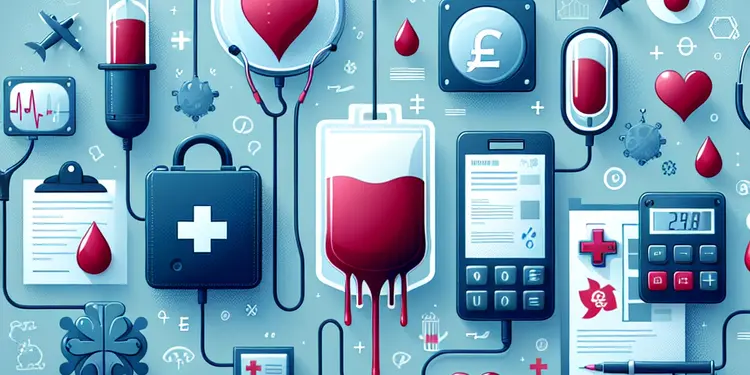
Find Help
More Items From Ergsy search
-
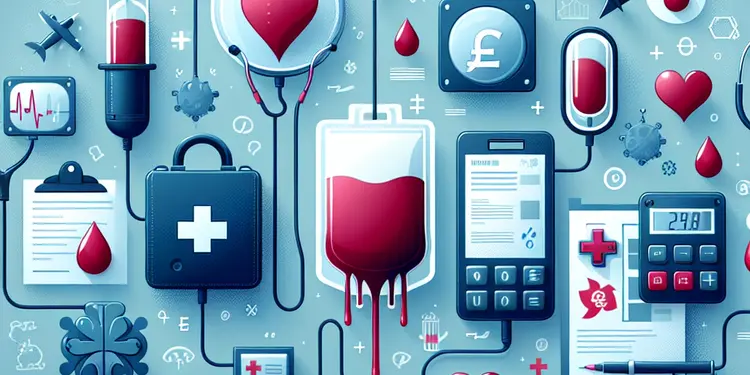
Can certain medical conditions prevent receiving blood transfusions?
Relevance: 100%
-
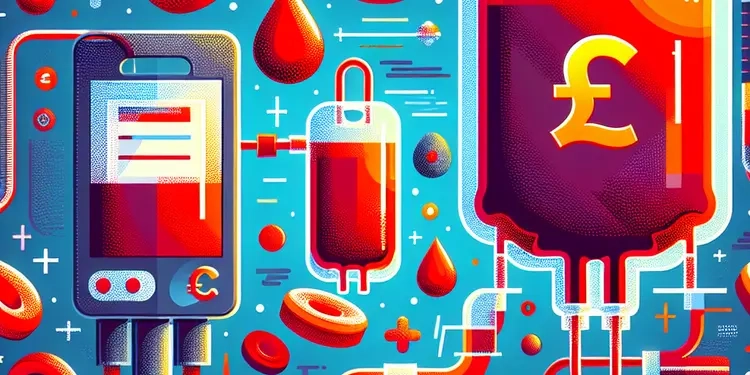
What is a blood transfusion?
Relevance: 84%
-

Blood Transfusion
Relevance: 83%
-

Blood Product Transfusions
Relevance: 81%
-

Are there risks associated with blood transfusions?
Relevance: 76%
-

Is there an age limit for receiving blood transfusions?
Relevance: 76%
-
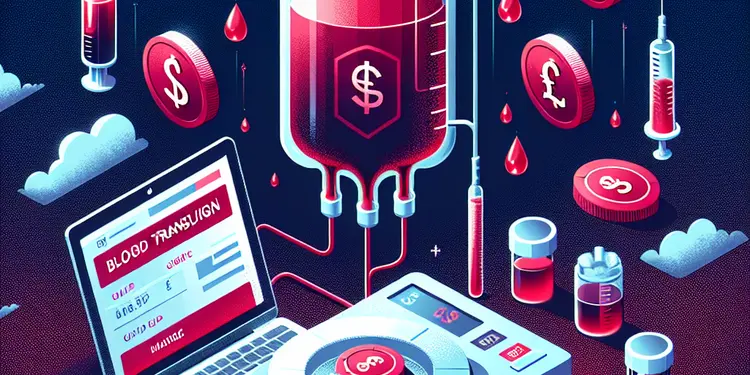
Why might someone need a blood transfusion?
Relevance: 75%
-
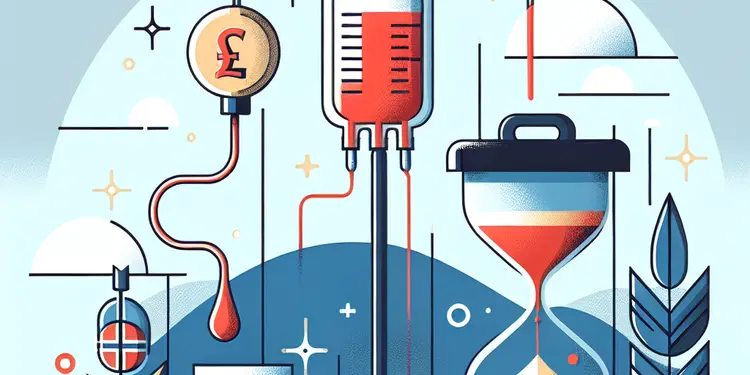
How long does a blood transfusion take?
Relevance: 74%
-
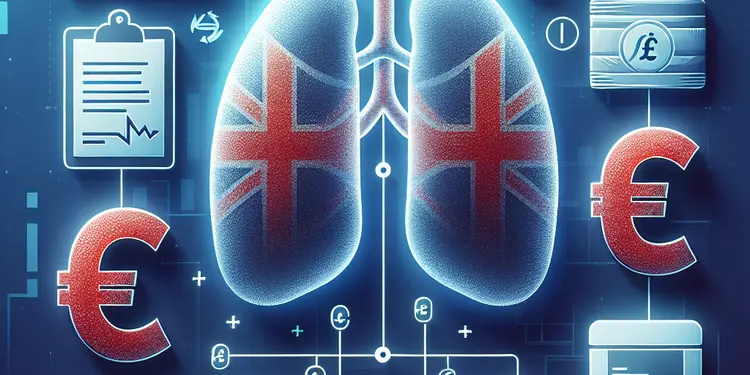
Is Hepatitis B a risk in blood transfusions?
Relevance: 73%
-
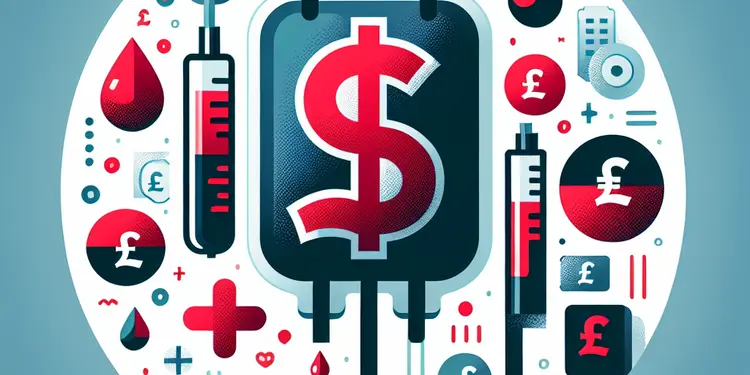
What are some common reasons blood transfusions are needed?
Relevance: 72%
-
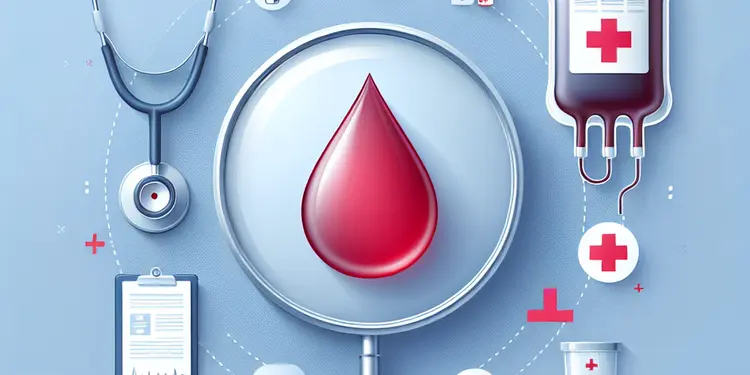
How do doctors determine how much blood is needed for a transfusion?
Relevance: 71%
-
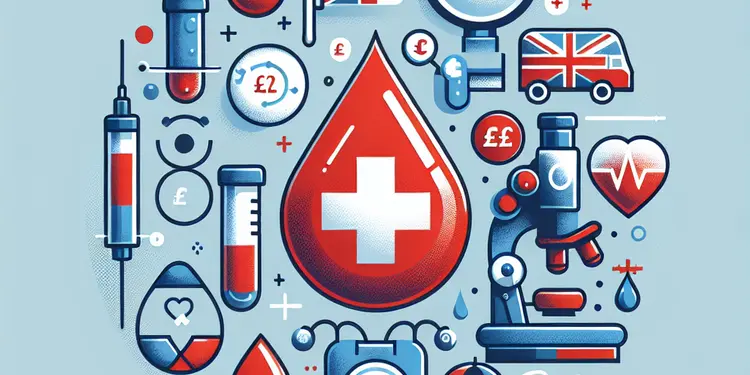
How do healthcare providers match blood for transfusions?
Relevance: 71%
-
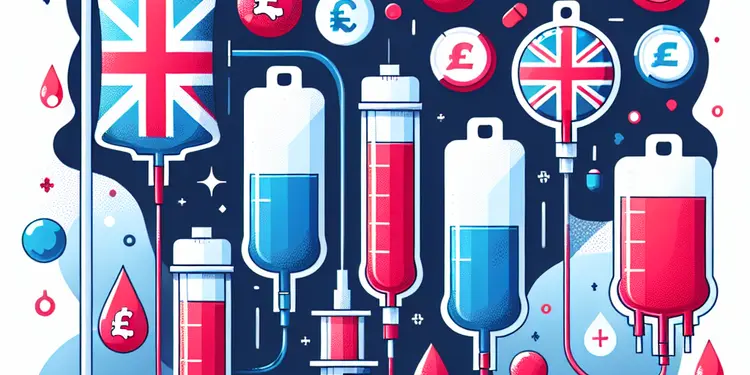
What types of blood products can be transfused?
Relevance: 70%
-
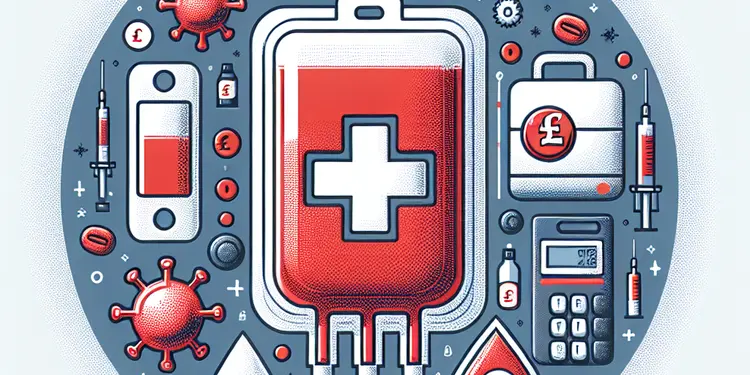
Is HTLV a risk in blood transfusions?
Relevance: 70%
-
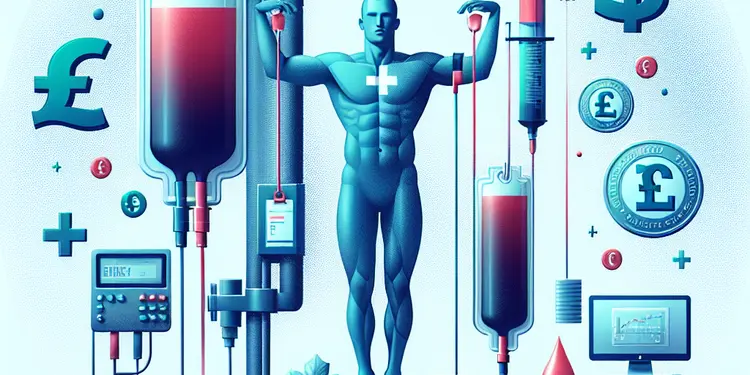
Can someone have a reaction to a mismatched blood transfusion?
Relevance: 69%
-

What diseases can be spread by blood transfusions?
Relevance: 68%
-
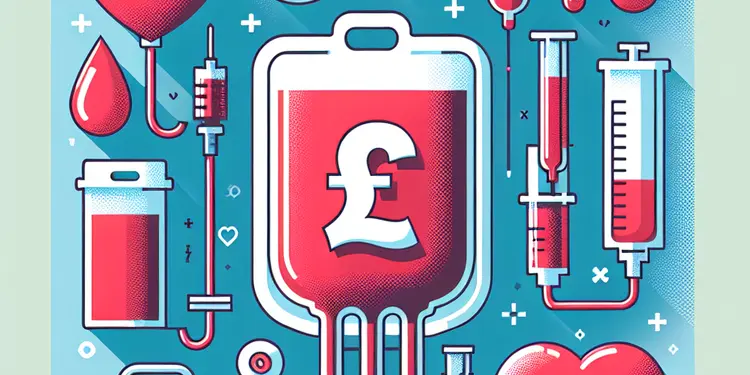
Can HIV be transmitted through blood transfusions?
Relevance: 67%
-
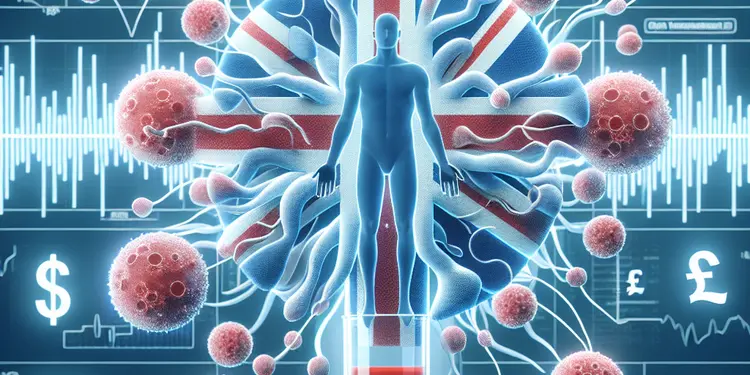
Can syphilis be transmitted via blood transfusion?
Relevance: 67%
-
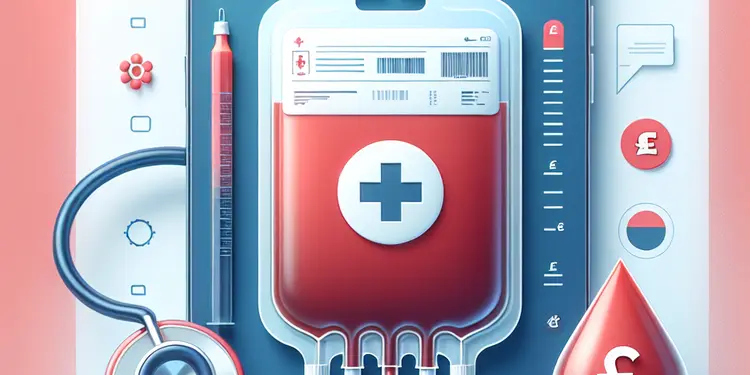
Can bacterial infections be transmitted through blood transfusion?
Relevance: 66%
-

Is Chagas disease a concern with blood transfusions?
Relevance: 66%
-
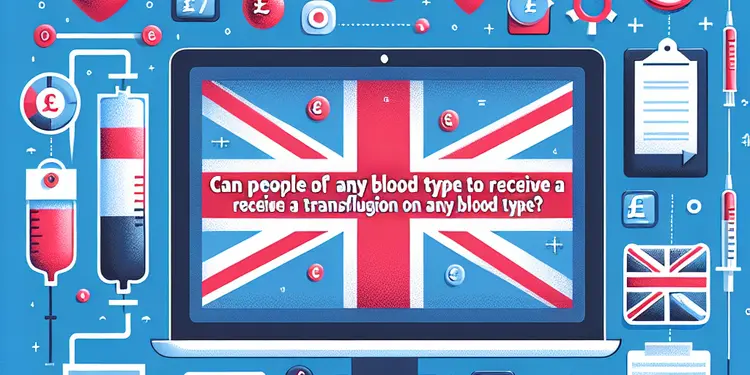
Can people of any blood type receive a transfusion of any blood type?
Relevance: 66%
-

Are there any parasites that can be transmitted through blood transfusions?
Relevance: 65%
-
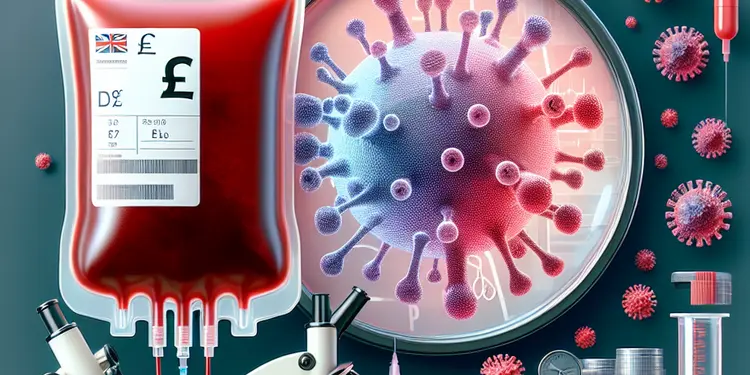
What is the most common disease transmitted by blood transfusion?
Relevance: 65%
-

Is malaria still a concern for blood transfusion safety?
Relevance: 65%
-

Is Zika virus screened for in blood transfusions?
Relevance: 65%
-
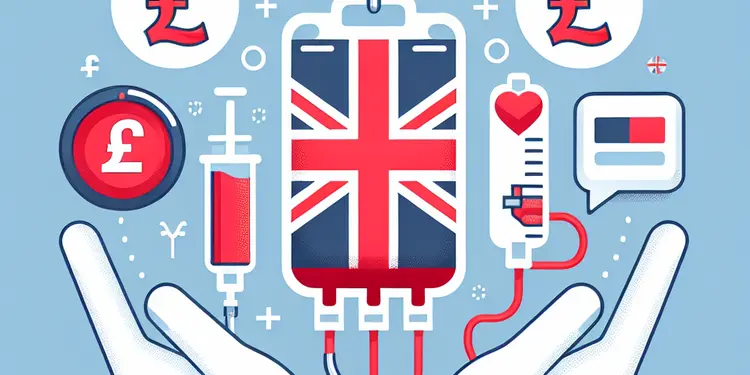
Can COVID-19 be transmitted through blood transfusions?
Relevance: 63%
-
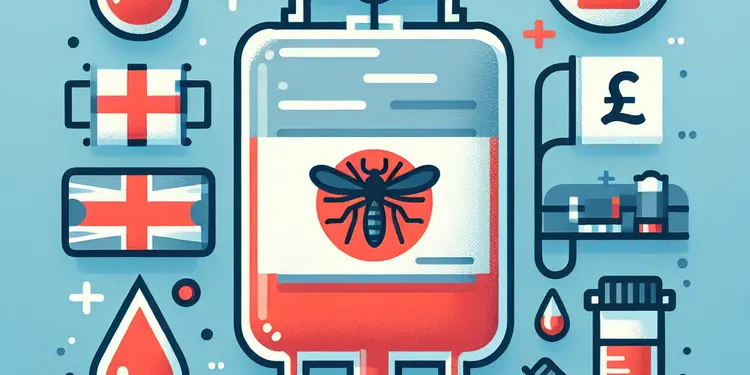
Can Dengue fever be transmitted through blood transfusions?
Relevance: 63%
-
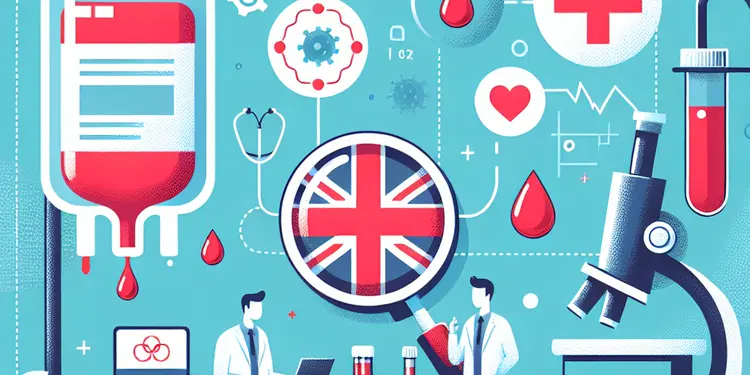
Can you get any prion diseases from blood transfusion?
Relevance: 61%
-
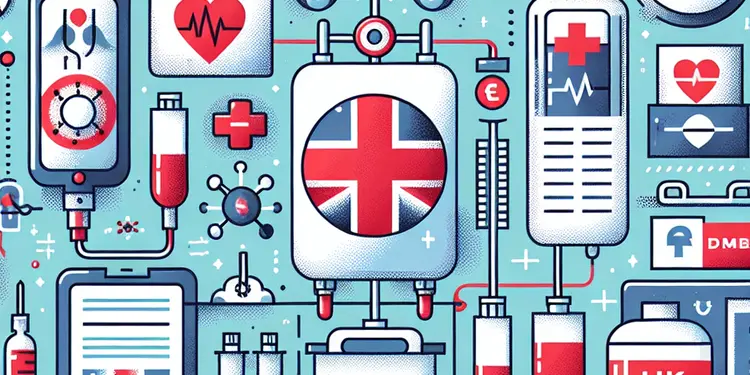
What measures are taken to prevent disease transmission in blood transfusions?
Relevance: 60%
-

What is plasma, and why might it be transfused?
Relevance: 59%
-
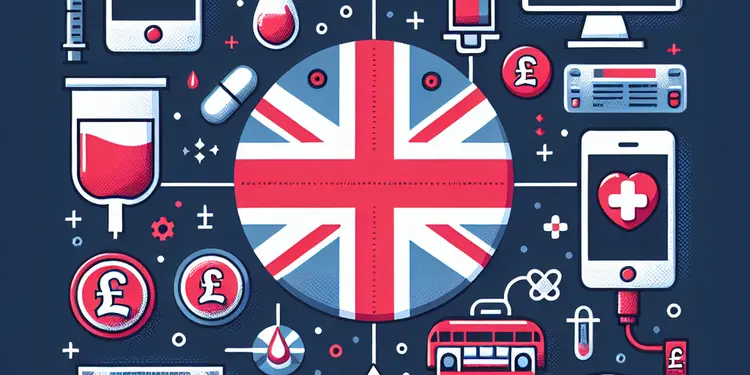
Is blood used for transfusions safe?
Relevance: 55%
-
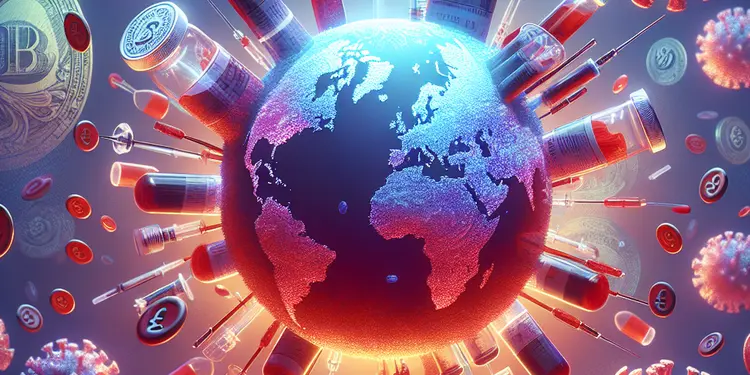
Can cytomegalovirus (CMV) be spread through transfusions?
Relevance: 53%
-

Are there global differences in screening for blood transfusions?
Relevance: 51%
-
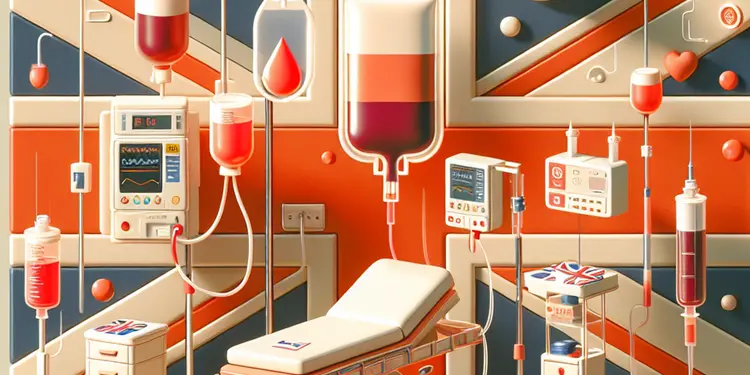
What should a patient expect after a blood transfusion?
Relevance: 49%
-
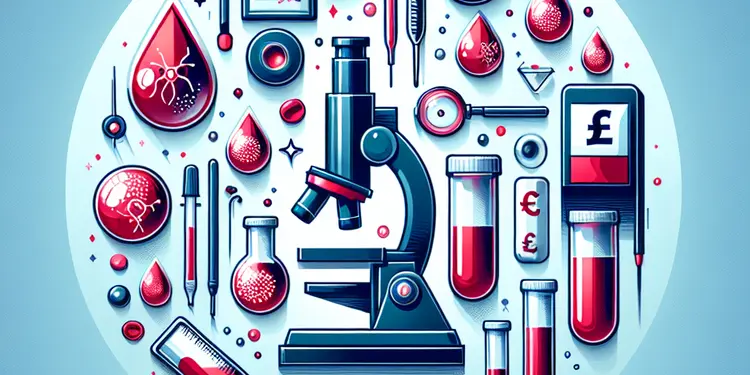
How is blood screened to prevent disease transmission?
Relevance: 49%
-
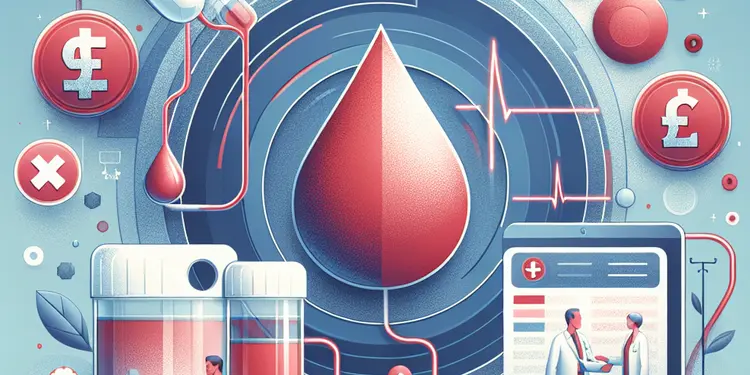
What kind of follow-up care is needed after a blood transfusion?
Relevance: 47%
-
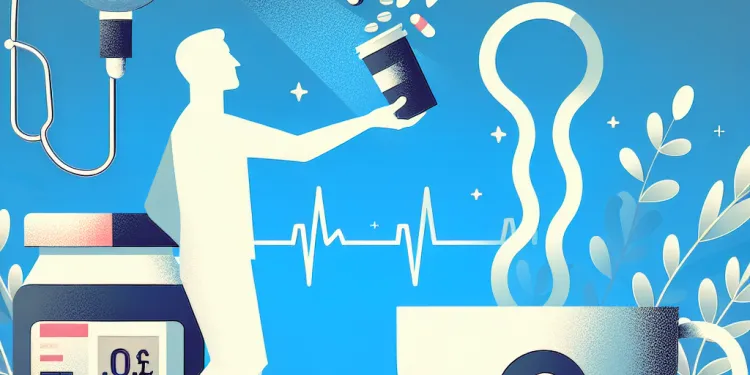
Is it safe to take blood pressure medication with coffee?
Relevance: 46%
-

How do medications help control high blood pressure?
Relevance: 45%
-
Should individuals with certain medical conditions avoid aspirin?
Relevance: 41%
-

Can homeopathy treat all medical conditions?
Relevance: 41%
Introduction
Blood transfusions are a critical component of modern medicine, potentially lifesaving for patients with a variety of medical conditions. However, there are circumstances where certain medical conditions may pose challenges or contraindications to receiving blood transfusions. Understanding these conditions is vital for both healthcare providers and patients.
General Considerations
Before a blood transfusion is conducted, healthcare professionals in the UK consider the patient's overall health status and specific medical conditions. This includes assessing the risks and benefits associated with the transfusion. The primary goal is always to ensure that the benefits outweigh any potential risks.
Allergic Reactions
Some patients may experience allergic reactions to blood transfusions, although these reactions are often mild and manageable. However, severe reactions, such as anaphylaxis, can occur in rare cases. Patients with a history of severe allergic reactions may require pre-medication or special transfusion protocols.
Immune System Disorders
Patients with certain immune system disorders, such as those with compromised immune systems due to conditions like HIV/AIDS or undergoing immunosuppressive therapy, may face additional challenges. The risk of transfusion-related infections can be higher, necessitating stringent blood screening and handling protocols.
Sickle Cell Disease
Individuals with sickle cell disease often require frequent blood transfusions. However, over time, they might develop antibodies against donor blood cells, leading to complications. Careful matching of donor blood and regular monitoring are essential to mitigate these issues.
Hemophilia and Bleeding Disorders
Patients with hemophilia or other bleeding disorders may require transfusions of specific blood components like clotting factors. However, a potential complication is the development of inhibitors against these clotting factors, which can complicate treatment. Specialised care and treatment plans are necessary in these cases.
Jehovah's Witnesses and Blood Transfusions
While not a medical condition, it is important to mention that Jehovah's Witnesses typically refuse blood transfusions due to religious beliefs. In the UK, healthcare professionals strive to respect these beliefs, offering alternatives such as cell salvage and synthetic volume expanders when possible.
Conclusion
While various medical conditions can pose challenges to blood transfusions, advances in medical technology and tailored transfusion protocols have significantly reduced the risks. Healthcare providers in the UK are equipped to handle these complexities, ensuring that patients receive the safest and most effective care possible.
Introduction
Blood transfusions mean giving blood to someone who needs it. They can save lives. But sometimes, if someone has certain health problems, it can make giving or getting blood hard. It is important to know about these health problems. This helps doctors and patients make safe choices.
General Considerations
Before giving blood, doctors in the UK check the person's health. They look at the good and bad things about giving blood. The main goal is to make sure it helps more than it harms.
Allergic Reactions
Sometimes, people are allergic to new blood. Most of the time, it's not too bad. But, in rare cases, it can be very serious. People with strong allergies might need medicine before blood or special care when getting blood.
Immune System Disorders
Some people have weak immune systems, like those with HIV/AIDS. This can make it risky when getting blood because they might get infections more easily. Extra careful checks are needed in these cases.
Sickle Cell Disease
People with sickle cell disease often need blood. But over time, their bodies might not like new blood. It's important to match the blood closely and keep checking their health.
Hemophilia and Bleeding Disorders
People with hemophilia need special parts of blood to help them stop bleeding. Sometimes their bodies stop the special help from working. They need careful treatment and planning.
Jehovah's Witnesses and Blood Transfusions
Jehovah's Witnesses are a group who usually say no to blood because of their religion. In the UK, doctors try to respect this and find other ways to help them, like using special machines to save and return their own blood.
Conclusion
Even though some health problems make blood transfusions tricky, new medical tools and care plans help make it safer. UK doctors work hard to give the best care and make sure getting blood is safe.
Frequently Asked Questions
Can certain medical conditions prevent receiving blood transfusions?
Yes, certain medical conditions can make blood transfusions risky or contraindicated.
Which medical conditions might prevent someone from receiving a blood transfusion?
Conditions such as severe allergies to blood products, certain types of infections, or autoimmune disorders may prevent transfusions.
Can religious beliefs impact the decision to receive a blood transfusion?
Yes, some individuals, such as Jehovah's Witnesses, may refuse blood transfusions due to religious beliefs.
Are there alternative treatments to blood transfusions for those who cannot receive them?
Yes, options may include volume expanders, erythropoietin, or other medications to stimulate blood production.
How is blood compatibility determined for a transfusion?
Blood type and crossmatching tests are conducted to ensure compatibility between donor and recipient blood.
Can someone with a history of transfusion reactions receive blood transfusions?
It depends on the severity of past reactions; pre-medication and careful monitoring may allow safe transfusion.
What are the risks of receiving a blood transfusion?
Risks include allergic reactions, fever, iron overload, and very rarely, infections.
Can individuals with autoimmune hemolytic anemia receive blood transfusions?
It depends on the case and underlying cause; careful matching and monitoring are needed if transfusions are given.
Are there specific guidelines for blood transfusions in patients with heart problems?
Yes, patients with heart conditions may need special consideration to manage fluid balance during transfusions.
Is there a blood transfusion threshold for patients with chronic anemia?
Thresholds vary based on symptoms, underlying conditions, and individual patient needs.
Can individuals with clotting disorders receive blood transfusions?
Yes, but they might need specific blood products such as plasma or platelets rather than whole blood.
What is the role of informed consent in blood transfusions?
Patients should receive information about risks, benefits, and alternatives before consenting to a transfusion.
Can a blood transfusion be performed in an emergency without patient consent?
In life-threatening emergencies where consent cannot be obtained, doctors may proceed based on implied consent.
Can pregnant women receive blood transfusions?
Yes, if necessary, to treat severe anemia or other complications.
Are blood transfusions safe for cancer patients?
Yes, cancer patients frequently receive transfusions, especially to manage anemia induced by treatment.
Can liver disease affect the ability to receive a blood transfusion?
Caution is required as liver disease can impact clotting; transfusions might be necessary but need careful management.
How can the risk of transfusion-transmitted infections be minimized?
Blood is rigorously tested and screened for infectious agents to minimize risk.
Can a person donate blood if they have a medical condition that prevents them from receiving transfusions?
It depends on the condition; blood donation eligibility is assessed individually.
Can patients with kidney disease receive blood transfusions?
Yes, but they may require careful management of fluid balance and electrolytes.
What alternatives exist for patients with iron overload who need red blood cells?
Options might include chelation therapy or erythropoiesis-stimulating agents if regular transfusions are needed.
Can some people not get blood transfusions because they are sick?
Yes, some medical problems can make blood transfusions unsafe or not a good idea.
What health problems can stop someone from getting a blood transfusion?
Here is some clear information:
- Some illnesses can make it hard to get a blood transfusion.
- Always talk to a doctor if you have questions.
You can use tools like picture cards or apps to help you understand more.
Sometimes, people cannot get blood transfusions. This can happen if they have really bad allergies to blood, certain infections, or some illnesses where the body attacks itself.
Can what someone believes about their religion change their mind about getting a blood transfusion?
Some people might say "no" to a blood transfusion because of their religion. A blood transfusion is when doctors give someone new blood if they are sick or hurt.
For help, talk to a doctor or a nurse. They can explain why a blood transfusion is important.
It is also good to talk with family or someone you trust about your feelings and beliefs.
Yes, some people, like Jehovah's Witnesses, might say no to blood transfusions because of their religious beliefs.
What can people do if they can't have a blood transfusion?
Some people can't get blood transfusions. What other treatments can help them? There are different ways to help. Doctors can use special medicines or tools. These can help make more blood. Or they can help stop too much bleeding. It's important to talk to a doctor about the best ways to help.
Yes, there are things that can help. Doctors might use:
- Special fluids to add more liquid to your blood.
- Medicines like erythropoietin to help your body make more blood.
How do doctors know if blood is okay for a transfusion?
Doctors need to check if blood is a good match before giving it to someone. This is called a blood transfusion.
Doctors look at blood types. There are different blood types like A, B, AB, and O. They also check if the blood has something called Rh factor, which can be positive (+) or negative (-).
If the blood types and Rh factor match, the transfusion is safe.
Here are some helpful tips:
- Use simple pictures to show different blood types.
- Ask someone to explain it with simple words.
- Watch videos about blood types to understand better.
Blood tests check if the donor's blood and the person getting it can safely match.
Can a person who had problems with blood transfusions get blood again?
If you had issues with blood transfusion before, it is important to tell your doctor. They can help you so that it is safer.
Some people may still get blood with extra care.
Things that might help:
- Doctors can give medicine before the transfusion.
- They might use special blood to avoid problems.
Talk to your doctor and make sure you understand what is happening. Ask questions if you need to.
If someone has had strong bad reactions before, it is important to be very careful. Doctors can give medicine before the transfusion to help, and they will watch the person closely. This can make having a transfusion safer.
What risks come with getting a blood transfusion?
When you get blood from someone else, there are some risks to know about. Most of the time, everything goes well, but sometimes problems can happen. It's good to talk to your doctor about these risks.
- Allergic Reaction: Some people might have an allergy to the blood they get. This could make them itchy or give them a rash.
- Fever: Sometimes, a person might feel hot or get a fever after getting new blood.
- Infection: There is a very small risk of getting an infection from the blood. However, doctors are very careful, and they test the blood.
- Iron Overload: If someone gets many blood transfusions, they might get too much iron in their body. This is a rare problem.
It's important to ask questions and tell your doctor if you feel unwell during or after a blood transfusion.
Using tools like reading apps with voice options might make it easier to understand. You can also ask a family member or friend to explain more if needed.
Things that might happen include:
- Allergic reactions (this means your body doesn't like it)
- Fever (this means you get really hot)
- Too much iron in your body
- Infections (this happens very rarely)
You can use pictures or videos to help understand this better.
Can people with a condition where their blood cells are attacked get blood from others?
If you have a sickness where your body attacks your blood cells, you might need new blood from someone else. This is called a blood transfusion.
To understand better, you can:
- Ask a doctor questions.
- Get help from a family member.
- Use pictures or videos about blood transfusions.
It depends on the problem and what causes it. If someone needs a blood transfusion, doctors have to be very careful to match the blood and watch the person closely.
Are there special rules for giving blood to people with heart problems?
People with heart problems need extra care when they get a blood transfusion. Let's see what the doctors say:
- Doctors check the person's heart condition carefully.
- They might use less blood or do it more slowly.
- It's important to watch the person closely to make sure they stay safe.
If you have heart problems and need a blood transfusion, talk to your doctor. They will explain what will happen and answer your questions. There might be tools like pictures or videos that can help you understand better.
Always ask for help if you don't understand something. It's okay to ask questions!
Yes, people with heart problems might need extra care when getting a blood transfusion to make sure the right amount of fluid is in their body.
When should people with long-term anemia get blood?
People with anemia might need extra blood. It helps when they don't have enough healthy blood cells. Doctors use special numbers to decide when to give blood.
If you have anemia, ask your doctor for advice. They can tell you what’s best for you. You can use apps or ask someone to help you keep track of your health.
Thresholds are different for everyone.
They change because of symptoms, health problems, and what each person needs.
Can people with blood clotting problems get blood from others?
Yes, people with blood clotting problems can get blood from others. Doctors are there to help and make sure it is safe.
If you have questions, ask a doctor or nurse. They know a lot and can help you understand.
Drawing pictures or using apps that read aloud can help make things clearer too.
Yes, but they might need special parts of blood. These parts are called plasma or platelets. They don't need all of the blood.
Why do doctors need your permission before a blood transfusion?
When you need a blood transfusion, doctors must ask you first. This is called "giving permission." It means you understand what will happen and say "yes" to it. You should know why you need the blood, what it does, and any risks. Asking questions is important! You can use pictures or ask someone to help you understand better. If you're unsure, it's okay to say you need more time or help.
Before you agree to a blood transfusion, you should get information about:
- The risks: This means things that could go wrong.
- The benefits: This means the good things it can do for you.
- The alternatives: This means other choices you have.
It can help to talk with someone, like a nurse or doctor, if you have questions. You can also use a picture chart or videos to make things clearer.
Can doctors give blood in an emergency if the person can't say yes?
In really bad emergencies when someone can't say "yes" or "no," doctors can help without asking first. This is called implied consent.
Can pregnant women get blood transfusions?
Yes, women who are having a baby can get blood transfusions if they need it. A blood transfusion is when you get blood from someone else. Doctors give it to people to help them get better.
Sometimes, people need more blood to feel good and stay healthy. This can happen to women who are having a baby too.
If a pregnant woman needs more blood, doctors are there to help. They will make sure it is safe for her and the baby.
If you have questions, you can:
- Ask your doctor or nurse. They know a lot and can help you understand.
- Talk to your family. They can support you and help explain things.
- Use picture cards or drawings to make things clearer.
Yes, if needed, to help with very bad anemia or other problems.
Is it safe for cancer patients to get blood transfusions?
Yes, people with cancer often need blood transfusions. This is because their treatment can make them very tired and weak.
Can problems with the liver change if you can get a blood transfusion?
Be careful because liver problems can make it hard for blood to clot. Sometimes, blood transfusions are needed, but they must be done very carefully.
How can we make blood transfusions safer?
We want to make sure blood transfusions are safe.
Here are some ways to help:
- Test blood for germs before it is used.
- Use clean tools and equipment.
- Train people to be careful when giving blood.
- Have rules to check blood donors are healthy.
Using pictures, videos, and easy-to-read guides can help understand this better.
Blood is checked very carefully to make sure it is safe and has no germs in it.
Can someone give blood if they have a health problem and can't get blood from others?
If you have a health problem, ask your doctor if you can give blood.
Doctors and nurses know if it is safe for you and others.
If you want to know more, visit a blood donation center or website.
It depends on your health. Doctors will check if you can give blood. They decide for each person.
Can people with kidney problems get blood transfusions?
Yes, people with kidney problems can get blood transfusions.
If you have kidney problems and need a blood transfusion, doctors will help you. A blood transfusion is a safe way to give you healthy blood.
Tools like talking to a doctor or using picture books can help you understand more about blood transfusions.
Yes, but you need to be careful with the amount of water and salt in the body.
What can patients with too much iron do if they need red blood cells?
Some people have too much iron in their blood. This can make it hard when they need help with red blood cells.
Doctors have different ways to help:
- Use medicine to lower iron levels. Medicine can help take some iron out of the blood.
- Try special blood treatments. These treatments can help remove extra iron from the body.
- Change diet. Eating less iron-rich food might help. Talk to a doctor for advice on what to eat.
- Talk to a health expert. They can give advice on what to do next.
It is important to get help from doctors. They will know what is best.
If you need to have blood given to you a lot, there are two things that might help:
1. A special treatment to take out extra metals from your body. This is called chelation therapy.
2. Medicine that helps your body make more red blood cells. These are called blood cell helpers.
If you find this hard to read, you can ask someone to read it with you or use tools that read text out loud.
Useful Links
This website offers general information and is not a substitute for professional advice.
Always seek guidance from qualified professionals.
If you have any medical concerns or need urgent help, contact a healthcare professional or emergency services immediately.
Some of this content was generated with AI assistance. We’ve done our best to keep it accurate, helpful, and human-friendly.
- Ergsy carfully checks the information in the videos we provide here.
- Videos shown by Youtube after a video has completed, have NOT been reviewed by ERGSY.
- To view, click the arrow in centre of video.
- Most of the videos you find here will have subtitles and/or closed captions available.
- You may need to turn these on, and choose your preferred language.
- Go to the video you'd like to watch.
- If closed captions (CC) are available, settings will be visible on the bottom right of the video player.
- To turn on Captions, click settings .
- To turn off Captions, click settings again.
More Items From Ergsy search
-

Can certain medical conditions prevent receiving blood transfusions?
Relevance: 100%
-

What is a blood transfusion?
Relevance: 84%
-

Blood Transfusion
Relevance: 83%
-

Blood Product Transfusions
Relevance: 81%
-

Are there risks associated with blood transfusions?
Relevance: 76%
-

Is there an age limit for receiving blood transfusions?
Relevance: 76%
-

Why might someone need a blood transfusion?
Relevance: 75%
-

How long does a blood transfusion take?
Relevance: 74%
-

Is Hepatitis B a risk in blood transfusions?
Relevance: 73%
-

What are some common reasons blood transfusions are needed?
Relevance: 72%
-

How do doctors determine how much blood is needed for a transfusion?
Relevance: 71%
-

How do healthcare providers match blood for transfusions?
Relevance: 71%
-

What types of blood products can be transfused?
Relevance: 70%
-

Is HTLV a risk in blood transfusions?
Relevance: 70%
-

Can someone have a reaction to a mismatched blood transfusion?
Relevance: 69%
-

What diseases can be spread by blood transfusions?
Relevance: 68%
-

Can HIV be transmitted through blood transfusions?
Relevance: 67%
-

Can syphilis be transmitted via blood transfusion?
Relevance: 67%
-

Can bacterial infections be transmitted through blood transfusion?
Relevance: 66%
-

Is Chagas disease a concern with blood transfusions?
Relevance: 66%
-

Can people of any blood type receive a transfusion of any blood type?
Relevance: 66%
-

Are there any parasites that can be transmitted through blood transfusions?
Relevance: 65%
-

What is the most common disease transmitted by blood transfusion?
Relevance: 65%
-

Is malaria still a concern for blood transfusion safety?
Relevance: 65%
-

Is Zika virus screened for in blood transfusions?
Relevance: 65%
-

Can COVID-19 be transmitted through blood transfusions?
Relevance: 63%
-

Can Dengue fever be transmitted through blood transfusions?
Relevance: 63%
-

Can you get any prion diseases from blood transfusion?
Relevance: 61%
-

What measures are taken to prevent disease transmission in blood transfusions?
Relevance: 60%
-

What is plasma, and why might it be transfused?
Relevance: 59%
-

Is blood used for transfusions safe?
Relevance: 55%
-

Can cytomegalovirus (CMV) be spread through transfusions?
Relevance: 53%
-

Are there global differences in screening for blood transfusions?
Relevance: 51%
-

What should a patient expect after a blood transfusion?
Relevance: 49%
-

How is blood screened to prevent disease transmission?
Relevance: 49%
-

What kind of follow-up care is needed after a blood transfusion?
Relevance: 47%
-

Is it safe to take blood pressure medication with coffee?
Relevance: 46%
-

How do medications help control high blood pressure?
Relevance: 45%
-
Should individuals with certain medical conditions avoid aspirin?
Relevance: 41%
-

Can homeopathy treat all medical conditions?
Relevance: 41%


